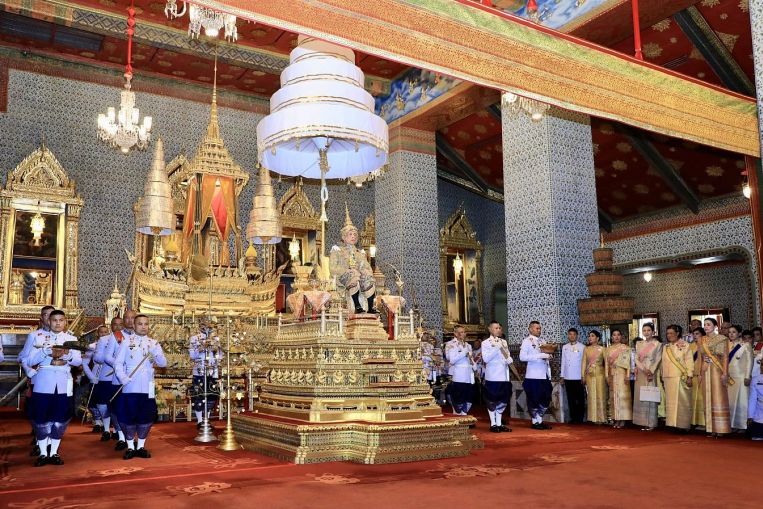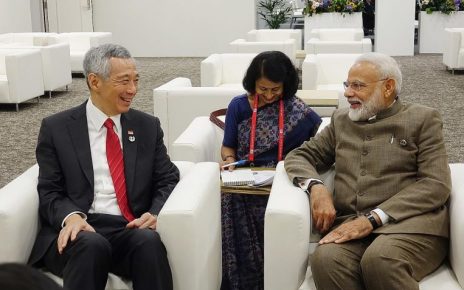
was formally crowned yesterday in the kingdom’s first coronation in almost seven decades.
The 66-year-old monarch was sprinkled with water collected from around the kingdom, before donning a 7.3kg diamond-topped crown and reading out his first royal command.
“I shall continue, preserve and build upon the royal legacy, and shall reign with righteousness for the benefit and happiness of the people always,” he said in the Grand Palace before members of the royal family and senior officials, including Singapore’s ambassador to Thailand Chua Siew San, who was dean of the diplomatic corps.
The King then proceeded to install Queen Suthida, the deputy commander of his bodyguard unit who had been announced as his wife on Wednesday.
Later, he was ferried on a palanquin to Bangkok’s Temple of the Emerald Buddha, where he pronounced himself patron of Buddhism in the country. The newly minted queen sat alongside her husband during religious rituals in the evening.
Yesterday’s coronation took place amid much political uncertainty.
The kingdom has been ruled by a military junta since a coup in 2014. While it held an election in March, official results will only be released by Thursday, amid dispute over the method of allocation of parliamentary seats and allegations by one of the top winning political parties that the junta is trying to destroy it with spurious charges.
The monarch, meanwhile, has been an assertive and unpredictable figure since taking the throne after the death in 2016 of his revered father Bhumibol Adulyadej. King Vajiralongkorn is the 10th king of the Chakri dynasty, and is also known as King Rama X.
While Thailand is a constitutional monarchy, the royal family has extensive influence, wealth and power.
Over the past three years, King Vajiralongkorn has consolidated personal control over royal guards and the Crown Property Bureau, which was estimated to hold over US$40 billion (S$54 billion) worth of assets in 2014. He now personally appoints members of the Sangha Supreme Council, where the Buddhist country’s most senior monks sit.
Meanwhile, members of a new civilian volunteer corps wear signature yellow and blue uniforms and salute the King’s portrait before conducting any community activity, like cleaning roads and running public kitchens.
Thailand’s strict lese majeste law makes insulting or defaming the king, queen, regent or heir apparent punishable by up to 15 years in jail.
As lese majeste complaints can be filed by anyone, critics argue that the ruling junta has wielded them liberally against political dissidents.
But lese majeste prosecutions abruptly dropped in recent months, something veteran historian Sulak Sivaraksa attributes to the personal intervention of the King himself.
Mr Sulak, who had a personal audience with the King in 2017, described the monarch as “very well-read”.
“Based on my impression, he was concerned about the survival of the monarchy, the state of the Thai sangha, and how democracy would work in Thailand,” the scholar told The Sunday Times.
Naresuan University political science lecturer Puangchon Unchanam, assessing the King’s first three years in power, told The Sunday Times: “Against all odds, he has shown to the public that he has more political skill, will and assertiveness to steer his reign than what many people thought he had, especially before he became King.”
He was also arguably more active than his father in protecting the political and economic interests of the crown, said Dr Puangchon.
“Before he ascended the throne, it was still somewhat debatable to what degree the monarch controlled, owned, and even cared about the Crown Property Bureau; and whether it belonged to the crown as an institution or the monarch as a person.
“Thai conservatives tended to say that it belonged to, and aimed to benefit, the nation as a whole, or the monarchy as an essential part of the nation – not the monarch as a person. Now, under Rama X’s reign, it is clear that it belongs solely to His Majesty.”
Tens of thousands of Thais are expected to descend on inner Bangkok today as the King rides a palanquin along a 7km route in symbolic circumambulation of the kingdom.
Street dessert vendor Rattima Thamrungkit told The Sunday Times: “I am glad Thailand still has the monarchy and see it stand strong and firm.”


